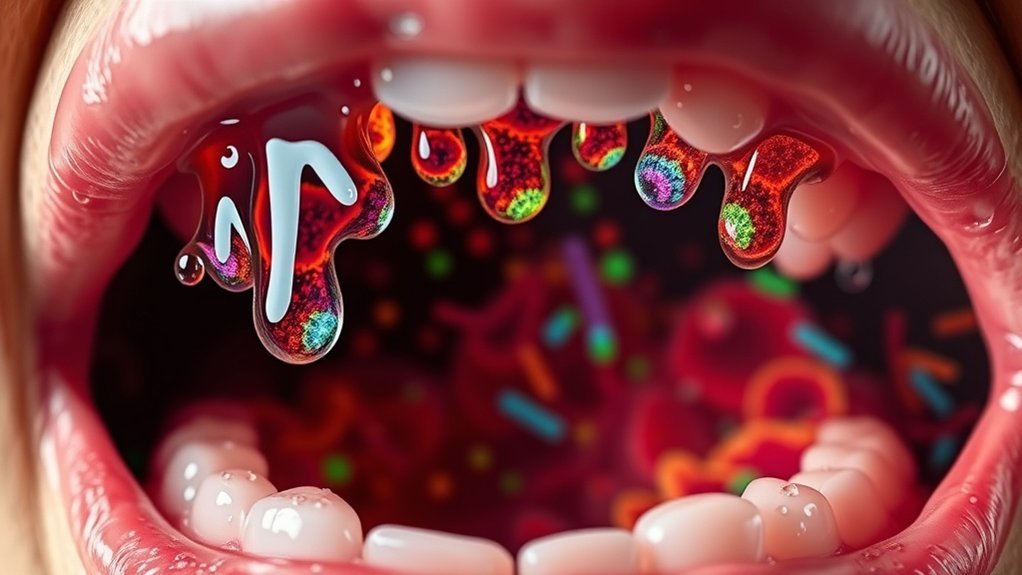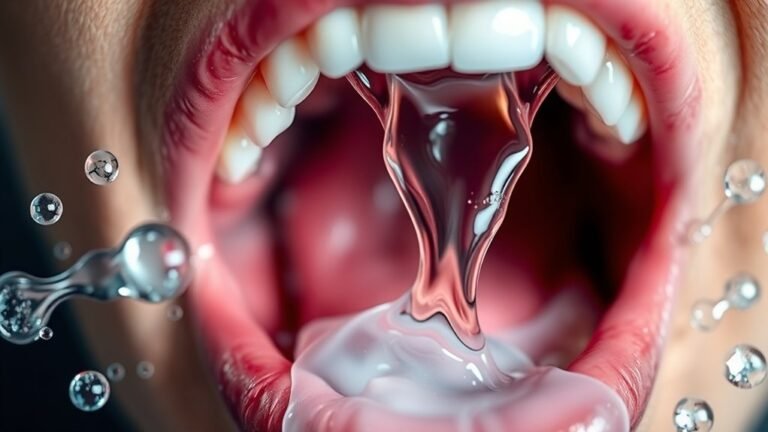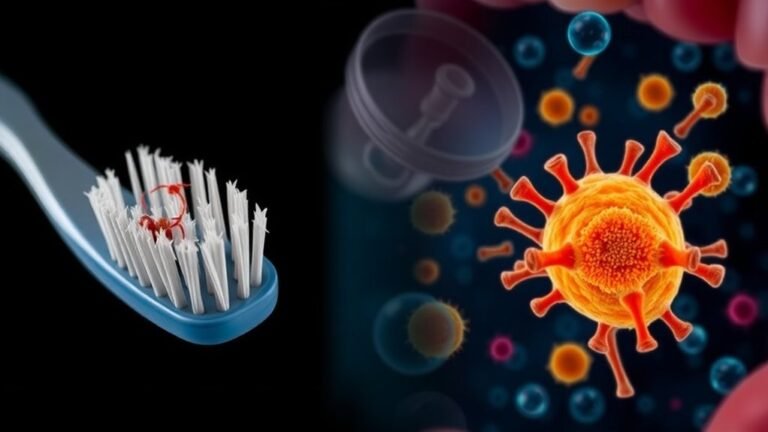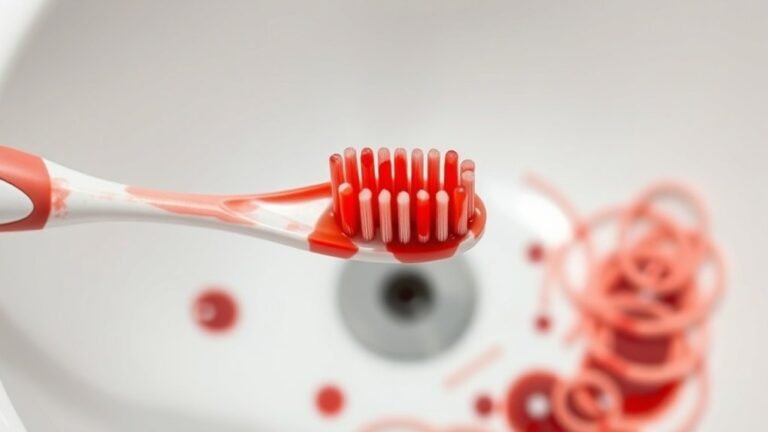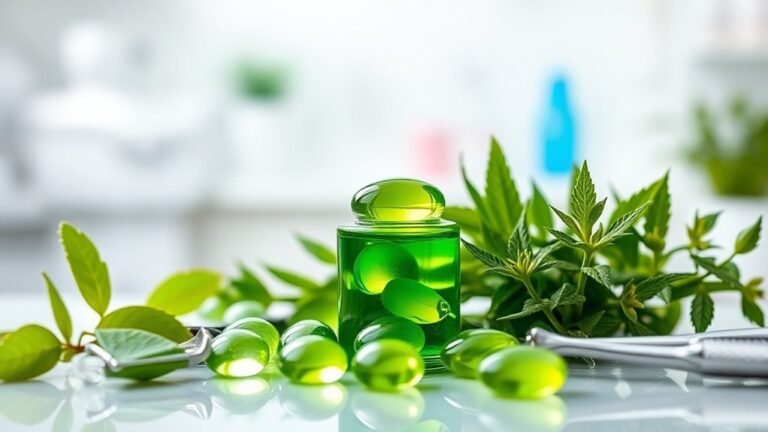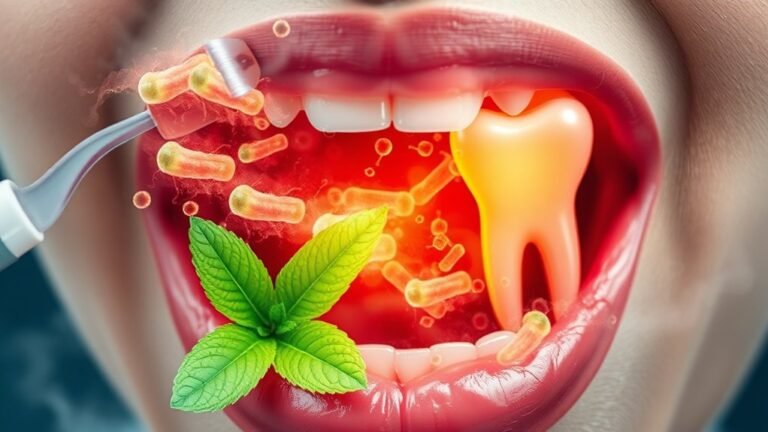What Roles Do Saliva and Enzymes Play in Defending Against Oral Bacterial Imbalance
Saliva and enzymes play essential roles in defending against oral bacterial imbalances. Saliva maintains moisture and contains antimicrobial agents that disrupt harmful bacteria, while enzymes like amylase start the digestion process, promoting a balanced oral environment. This combination helps neutralize acids, supports beneficial bacteria, and reduces the risk of plaque buildup and cavities. By understanding these functions, you’ll appreciate how your mouth stays healthy and the preventive measures occurring naturally.
Key Takeaways
- Saliva contains antimicrobial peptides that help maintain a balanced oral bacterial population by preventing the overgrowth of harmful bacteria.
- Enzymes like amylase and lipase initiate the digestion process, aiding in food breakdown and reducing bacterial growth.
- Saliva neutralizes acids produced by bacteria, protecting against enamel erosion and supporting overall oral health.
- Lysozyme in saliva disrupts bacterial cell membranes, preventing stable bacterial colonies and promoting a healthy oral ecosystem.
- Saliva’s buffering capacity helps wash away food particles, reducing plaque buildup and maintaining a conducive environment for beneficial bacteria.
The Composition of Saliva and Its Functions
Although you might not think about it often, saliva plays an essential role in maintaining oral health. This complex fluid comprises water, electrolytes, enzymes, antimicrobial agents, and mucins, each contributing to its functions. Saliva acts as a lubricant, facilitating chewing and swallowing while also aiding in taste perception. Importantly, it helps regulate the oral microbiome by creating a balanced environment that supports beneficial bacteria and inhibits harmful ones. The presence of enzymes like amylase initiates digestion, breaking down carbohydrates and reducing the food source for harmful bacteria. Additionally, saliva neutralizes acids produced by these bacteria, helping to prevent tooth decay. Understanding saliva’s composition and its multifaceted functions highlights its critical role in oral health maintenance.
Antimicrobial Properties of Saliva
Saliva not only lubricates the mouth but also serves as an important line of defense against microbial threats. One of its key functions is to maintain oral bacterial balance through the action of antimicrobial peptides. These small proteins are critical in combating harmful bacteria, preventing their overgrowth, and thereby protecting your oral health. By disrupting bacterial cell membranes, antimicrobial peptides guarantee that the population of pathogenic microorganisms remains in check. This balance is essential, as an imbalance can lead to conditions like gum disease and tooth decay. In addition, saliva’s ability to wash away food particles and neutralize acids complements its antimicrobial properties, making it an indispensable element in your oral defense system.
The Role of Enzymes in Digestion and Oral Health
When you think about oral health, the role of enzymes in digestion often comes to mind, as these biological catalysts are essential for breaking down food into absorbable nutrients. Enzymes like amylase and lipase start acting in the mouth, initiating the digestive process. This early breakdown of carbohydrates and fats not only aids digestion but also keeps your oral environment balanced. A well-functioning enzymatic system helps prevent the accumulation of food particles that bacteria feed on, reducing the risk of plaque buildup and cavities. Additionally, enzymes contribute to the overall microbial balance in your mouth, promoting a healthy oral ecosystem. Consequently, understanding the importance of enzymes isn’t just about digestion; it’s vital for maintaining ideal oral health.
How Saliva Maintains Ph Balance in the Mouth
The balance of pH in your mouth plays a significant role in oral health, and saliva is a key player in maintaining that equilibrium. Saliva helps neutralize acids produced by bacteria, which prevents enamel erosion and supports mucosal immunity. By buffering these acids, saliva guarantees that your oral environment remains conducive to beneficial bacteria while inhibiting harmful ones. Additionally, saliva aids in plaque control by washing away food particles and debris, further helping to stabilize pH levels. This dynamic action not only protects your teeth but also fosters a healthy oral microbiome. Therefore, maintaining balanced saliva levels is essential for promoting ideal pH, which ultimately safeguards your overall oral health.
The Impact of Saliva and Enzymes on Oral Bacterial Balance
While maintaining a balanced oral microbiome is crucial for your dental health, saliva and its enzymes play an essential role in managing the population of bacteria in your mouth. Saliva contains lysozyme, an enzyme that targets bacterial cell walls, effectively promoting biofilm disruption. This disruption prevents harmful bacteria from forming stable colonies that could lead to dental issues such as cavities and gum disease. Additionally, saliva’s other enzymes facilitate the breakdown of food particles, further reducing bacterial growth. By maintaining moisture and providing necessary nutrients, saliva fosters a healthy balance of beneficial bacteria, allowing your mouth to function at its best. Understanding these mechanisms highlights the importance of saliva in supporting oral health and preventing bacterial imbalances.
Frequently Asked Questions
How Does Dehydration Affect Saliva Production and Oral Health?
Dehydration considerably reduces saliva production, leading to dry mouth. This condition hinders your mouth’s ability to wash away food particles and bacteria, increasing the risk of tooth decay, gum disease, and overall oral health issues.
Can Certain Foods Enhance Saliva’s Antibacterial Properties?
Think of saliva as a knight, and certain foods—like crunchy fruits and veggies—as its armor. They boost saliva’s antibacterial properties, helping it fight off harmful bacteria, ensuring your oral health remains strong and resilient.
What Role Do Probiotics Play Alongside Saliva in Oral Health?
Probiotics enhance oral health by balancing bacterial populations, complementing saliva’s natural defense. They help inhibit harmful bacteria, promoting a healthy microbiome. Together, they support immunity and overall oral hygiene, reducing the risk of dental issues.
How Do Medications Influence Saliva Composition and Function?
Medications can alter saliva’s composition, like a painter changing a canvas. They might reduce flow or modify enzymes, affecting its protective qualities. This shift can lead to an imbalance, increasing vulnerability to oral health issues.
Are There Specific Enzymes That Target Harmful Oral Bacteria?
Yes, specific enzymes like lysozyme and lactoferrin target harmful oral bacteria. They break down bacterial cell walls and inhibit growth, helping maintain a balanced oral microbiome and prevent infections, promoting overall oral health.
Conclusion
In summary, saliva and its enzymes are vital defenders against oral bacterial imbalance. Did you know that saliva can contain up to 1,000 different proteins, each playing a role in maintaining oral health? By regulating pH levels and providing antimicrobial properties, saliva helps keep harmful bacteria at bay. Understanding these functions can empower you to take better care of your oral health, ensuring a balanced microbial environment that supports overall well-being.
